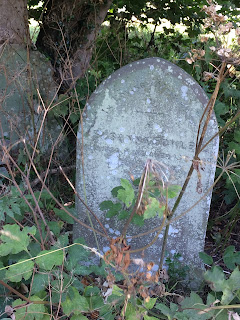Gravestone of Susanna Fowler, possibly a relative?!
(Theddlethorpe St. Helen's, Lincolnshire, July 2017)
Today is All Souls' Day, also known as the Commemoration of All the Faithful Departed by Roman Catholics, Episcopalians/Anglicans, and some Lutherans. It comes one day after All Saints' Day, a day the Church has historically set aside to honor all saints, known and unknown. Since I grew up Baptist, I was only vaguely aware of these two observances, and even now, after being United Methodist for over 2 decades, I honestly can't tell much of a difference between the two. For Methodists, "saints" covers all the "faithful departed," not just those who were formally canonized, so we have more or less conflated All Saints' and All Souls' into one. In fact, in our understanding, every person living or dead who bears witness faithfully to Christ is considered a saint.
Because of that, Methodist churches observe All Saints' Day as a way of honoring Christians of all times and places who exemplified Christian love and holiness in their daily lives. Because we have no method of electing or canonizing, this remembrance includes not only those who were formally designated saints by the Church but also local exemplars of the faith. Many congregations mark this feast of the Christian year with a solemn reading out of the names of their local saints who have died in the preceding year, often accompanied by the tolling of a bell.
John Wesley found the observance of All Saints' to be comforting, and he seems to have had a special fondness for that day, but he was wary of putting too much emphasis on saints, warning that while Christians should honor the saints, they should not worship them. For that reason, when he crafted a worship book for American Methodists, he omitted most of the feast days listed in the Book of Common Prayer, remarking that "most of the holy days were at present answering no valuable end."
It therefore should come as no surprise that the great poet of the Methodist revival, Charles Wesley, speaks eloquently of the communion of the saints and the great gathering in the life to come, expressing in verse the deep yearning felt by those Christians still on earth as they await their entrance into paradise.
Charles Wesley describes our being drawn to Jesus by the "lodestone" or "magnet" of his love, pointing out that as we move ever closer to Christ, we also move closer to each other until we are united by his grace and bound together in perfect love. He asks that God would bestow the gift of "the mind that was in Christ" as a present reality for Christians still on earth so that they will hardly notice a change at all once their earthly life is done and they glide into paradise. He concludes this lovely hymn-prayer by extolling love above all other virtues or gifts, proclaiming:
In earth, in paradise, in Heav’n,
Our all in all is love.
Marker of the graves of a Fowler preacher
buried at Wesley's Chapel, City Road, London
(photo taken June 2017)
The entire text of his hymn is printed below so that you may pray or sing it as you reflect and remember the saints who have blessed you in your Christian journey. As you read the words, may you be drawn closer to God by the "lodestone" of divine love that binds us all together, the "threefold cord" that is unbreakable, as we are being made perfect in love through the Spirit, until the time we ride on angels' wings triumphant into the skies, singing that "our all in all is love."
Jesu, united by Thy grace,
And each to each endeared,
With confidence we seek Thy grace,
And know our prayer is heard.
Still let us own our common Lord,
And bear Thy easy yoke,
A band of love, a threefold cord,
Which never can be broke.
Make us into one Spirit drink;
Baptize into Thy name;
And let us always kindly think,
And sweetly speak, the same.
Touched by the lodestone of Thy love,
Let all our hearts agree,
And ever toward each other move,
And ever move towards Thee.
To Thee, inseparably joined,
Let all our spirits cleave;
O may we all the loving mind
That was in Thee receive.
This is the bond of perfectness,
Thy spotless charity;
O let us, still we pray, possess
The mind that was in Thee.
Grant this, and then from all below
Insensibly remove:
Our souls their change shall scarcely know,
Made perfect first in love.
With ease our souls through death shall glide
Into their paradise,
And thence, on wings of angels, ride
Triumphant through the skies.
Yet, when the fullest joy is given,
The same delight we prove,
In earth, in paradise, in Heav’n,
Our all in all is love.



No comments:
Post a Comment